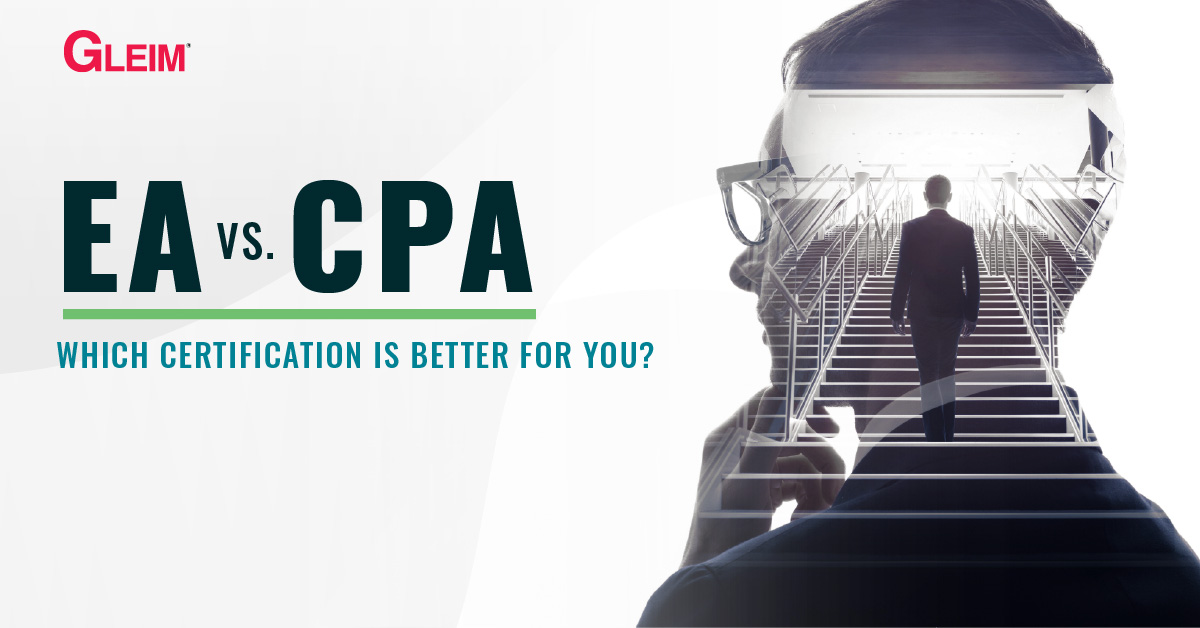Contact Us : 800.874.5346 International: +1 352.375.0772

[By: Stephanie Ng]
If you plan to enhance your career as a tax professional, you’re probably facing a daunting choice of designations: Enrolled Agent vs CPA. Both are good options, but each has pros and cons that will affect your career long-term. To help you make this decision, I’ll discuss the distinct features of each.
Enrolled agents, or EAs, are tax preparers the IRS has authorized to represent taxpayers. Enrolled agent clients include individuals, partnerships, corporations, estates, trusts, and any entities with tax-reporting requirements.
Certified Public Accountants, or CPAs, are licensed accountants with the statutory privilege to sign an audit report. They can prepare financial accounts, provide audit services, and advise clients on tax matters. Normally, the clients of CPAs are businesses requiring both accounting and tax services.
The steps to becoming an EA or a CPA are quite similar. The main difference between these two processes is the manner in which you fulfill the basic requirements.
In order to become an enrolled agent, you must either take the Special Enrollment Exam (SEE), also known as the enrolled agent (EA) exam, or have previous work experience at the IRS. While passing the exam is much easier once you’ve acquired several years of tax experience, there is no prerequisite for taking the EA exam. Therefore, you could sit for it during college if you wanted. You just need a Personal Tax Identification Number (PTIN) to schedule the exam.
In contrast, you must meet educational requirements to take the CPA Exam. The various state boards of accountancy establish the CPA Exam application and licensure requirements, and almost every one expects you to have 120 credit hours of education to sit for the exam. Yes, this requirement is equivalent to a bachelor’s degree, and many state boards also prefer you have your degree in accounting.
The EA exam has three parts, and most people find the first and third parts to be the easiest because some experienced tax professionals can pass these parts with minimal studying. Conversely, almost everyone must work hard to pass the second part–Businesses– so it’s naturally considered the hardest.
On the other hand, the CPA Exam has four parts and much broader content. The section equivalent to the EA exam is Regulation (REG), and only about 70% of the REG content directly relates to the EA exam. The rest covers other topics such as business law.
Still, when we compare REG’s taxation section to the EA exam’s taxation section, we uncover quite a lot of overlap. In fact, the amount of shared content can help candidates earn both certifications at the same time. Candidates who have trouble passing REG can shift their focus to passing the EA exam and earning the EA designation. Once they’ve done so, they can use their expanded tax knowledge to return to the CPA Exam, pass it, and get their CPA license as well.
As I said, the EA exam has three parts. The only time you can’t take the EA exam is March-April. Otherwise, the testing window runs from May 1-February 28, and you can take the exam any time within that window. You can take the exam parts hours, days, or months apart, and you can arrange them in any order you like. If you fail an EA exam part, you can take it three more times (a total of four) during the testing window. The best way to pass the EA exam in a timely manner is to use an EA review course and stick to a study schedule. This study schedule should include taking all three parts in two years.
The CPA Exam has testing all year long, but it has a shorter period to pass all four exams. You must pass all four parts of the CPA Exam within a rolling 18-month period that begins as soon as you pass your first exam section. Once you pass your first section, you have 18 months to pass the remaining three sections. If you don’t pass the remaining sections within this time, you will lose credit for the first section you passed. You must then pass that section and any other unpassed sections within 18 months of the time you passed your second section. With such regulated deadlines, relying on a CPA review course and studying consistently are essential for CPA Exam success.
If you pursue the enrolled agent designation via the EA exam, you don’t have to meet an experience requirement. You simply must pass the exam. You’ll receive your exam results immediately, and once you’ve passed, you can apply for enrollment. The IRS explains that processing your application may take as long as 60 days (90-120 days if you’re a former IRS employee). Also, as part of their evaluation of your enrollment application, the IRS will conduct a suitability test that includes a review of your personal tax compliance.
To complete your journey to the CPA license, once you’ve passed all four CPA Exam sections, you must meet the experience and education requirements. The 150-hour education requirement expects you to earn an additional 30 credit hours on top of your base 120 hours (120 + 30 = 150). Satisfying the experience requirement usually involves working in an accounting position for 1-2 years.
While there could be exceptions to the rule, CPA licensure generally has a much higher barrier of entry than the enrolled agent credential.
For more information on the exams, check out our free EA Exam Guide and our CPA Exam Guide.
Enrolled agents usually don’t work for a firm. They have their own clients and therefore can work at home with flexible hours. Many CPAs start out in audit firms, but as they accumulate experience, they can launch their own CPA firms and have their own clients.
According to Payscale.com, enrolled agents typically make between $33K to $80K a year, while CPAs make between $49K to $115K per year. Enrolled agents also have the opportunity to earn extra money during tax season. I have a reader who actually made more during those few months than he usually earns for the year in retail.
Finally, if you’re wondering how the IRS views enrolled agents and CPAs, the answer is that the IRS puts them on the same level.
Both enrolled agents and CPAs can supply their clients with superior service. To prove it, let’s start by looking at how enrolled agents add value and then consider the assistance CPAs can provide.
Enrolled agents are tax specialists.
EAs work on tax matters only, so they can specialize in certain areas such as tax preparation or tax resolution. Therefore, CPAs who specialize in tax should consider obtaining the EA so they can display their tax expertise.
The EA designation is a federal credential.
Since the enrolled agent credential comes from the IRS and includes the unlimited right to practice on a federal level, EAs can work with clients who have filings all across the United States.
Enrolled agents are a more affordable option than tax attorneys.
Usually, enrolled agents can perform the same services as a tax attorney for a much lower price. For example, enrolled agents can represent their clients in civil resolution cases.
Taking the EA exam is faster than taking the CPA Exam.
As you probably remember, the EA exam only has three parts, while the CPA Exam has four.
Additionally, the questions on the REG CPA Exam section are harder than those on the EA exam. The REG questions don’t go into as much detail about tax, but they are more varied and complicated, partially because the CPA Exam contains multiple-choice questions and task-based simulations. The EA questions are easier, so most candidates only need a few months to pass the EA exam as opposed to the 12-18 months typically needed to pass the CPA Exam. In this case, the benefit of the EA exam is that the sooner you can get licensed, the sooner you and your clients can enjoy your improved status with the IRS.
CPAs can handle both accounting and tax matters.
A CPA’s expertise mainly lies in accounting and auditing, but most can provide tax filing services as well. This combination is attractive to small businesses that need both audit and tax services, preferably from the same team.
CPAs can take a holistic approach for better tax planning.
For businesses, hiring a CPA is the more sensible option because someone who “knows the numbers” can make better tax plans.
Enrolled agents are not as well-known as CPAs, but they are as good if not better with income tax matters. The path to the CPA is long and arduous but more popular. If you think this is the path for you, you can learn more about how to become a CPA at my site. But if you’d like to specialize in tax matters and get on the fast track to working at home with your own clients, then set your course for the EA credential. You can take the next step toward this designation by learning how to become an enrolled agent or seeing how hard the EA exam is. I wish you the best with whichever designation you choose!

Stephanie Ng began her career as an investment banker at Lehman Brothers in New York and Morgan Stanley in Hong Kong. She later joined her client to work in the Group Finance Department, where she spent five years specializing in corporate finance, mergers and acquisitions, and debt refinancing. She also extended her role to management accounting and financial accounting and obtained her U.S. CPA qualification.
She is also the Executive Committee member responsible for Finance at New Sight Eye Care, a charity registered in the United Kingdom and Hong Kong. She oversees the financial aspect of New Sight in Hong Kong, including accounting, taxation, financial management, and compliance.
Stephanie also is a published author of the book How to Pass the CPA Exam. Additionally, she created I Pass the CMA Exam, the first CMA help site. Her guidance and mentorship have helped hundreds of thousands of candidates pass their exams.
Stephanie graduated with Phi Beta Kappa from the University of Chicago, majoring in economics with a second concentration in public policy studies.